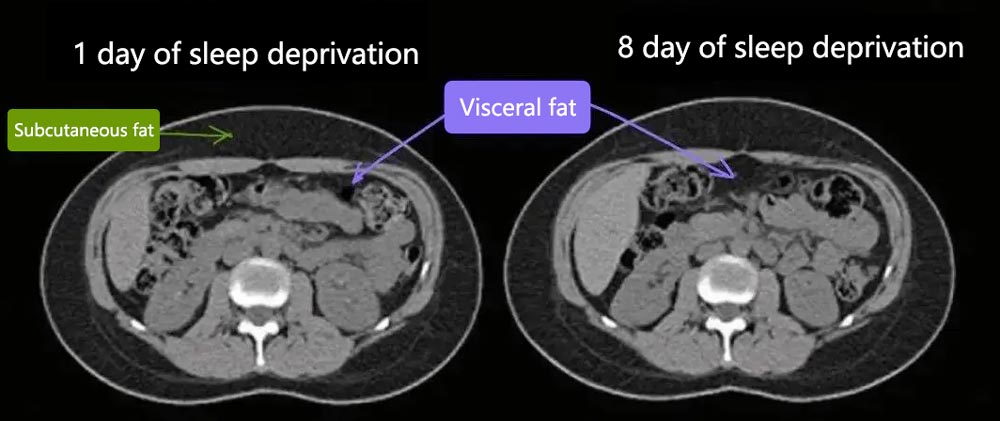As we age, some people gain weight faster, especially around their bellies. Besides factors like poor diet, stressful lifestyles, and prolonged sitting, there's another contributing factor: sleep deprivation.
◆ Two weeks of sleep deprivation can lead to belly fat
Scientists conducted a study confirming the link between sleep deprivation and abdominal obesity.
Subjects were divided into two groups, both placed in a sedentary environment with unlimited food:
- Sleep Deprivation Group: Limited to 4 hours of sleep per day;
- Sleep-Sufficient Group: No more than 9 hours of sleep per day.
The results showed that although both groups had similar energy expenditure and basal metabolic rates, the sleep-deprived group unintentionally ate more and gained more weight. In just two weeks, they gained an unintentional pound (1.5 catties) of weight, particularly around their bellies. The area of abdominal fat increased significantly by 9%.
Scientists speculate that this may be due to sleep deprivation. Lack of sleep makes the brain more sensitive to food stimuli, activating areas that process hunger signals and stimulates appetite and the foraging instinct.
Studies have shown that sleep deprivation can lead to an extra 308 calories, equivalent to a daily snack of one McNuggets and one ice cream cone... Fat quietly accumulates, turning into a fat belly.
And this is just the beginning of the harmful effects of sleep deprivation.
The fat gained from sleep deprivation may be "visceral fat." While it may be belly fat, there's a difference between fat "under the skin" and fat "in the viscera."
After discovering that sleep deprivation can cause belly fat, scientists further analyzed the proportion of visceral fat and concluded:
For people who get enough sleep and aren't sleep deprived, even if they accidentally eat more and gain a little weight, the excess is primarily subcutaneous, with no significant increase in visceral fat.
In contrast, people who lack sleep are not only more likely to gain weight, but also experience an 11% increase in visceral fat. Even catching up on sleep immediately after a sleep deprivation has no effect.

Sleep deprivation alters fat storage mechanisms, making it more likely to be transferred to the belly, where it forms "visceral fat," surrounding various internal organs, damaging the cardiovascular system and affecting metabolism.
Increased visceral fat is associated with an increased risk of many diseases, such as high blood pressure, stroke, heart disease, and diabetes. It can also lead to brain atrophy, impairing the brain's ability to process information, and even increasing the risk of multiple cancers simultaneously.
To avoid being "set up" by sleep deprivation, which accelerates belly fat and harms your health, you really need to find ways to get more sleep.
◆ An extra hour of sleep can actually help you lose weight.
If you sleep less than five hours a night, your risk of overall obesity and abdominal obesity increases by 27% and 16%, respectively, and in just five days, you can gain an average of 1.6 catties.
Sleeping for six hours or more, on the other hand, doesn't significantly increase the risk of any type of obesity. If you can manage to get an extra hour of sleep, you can even achieve "painless weight loss."
Studies have found that for people who average less than 6.5 hours of sleep, just one extra hour of sleep per night can reduce their daily calorie intake by approximately 162 kcal. After two weeks, those who didn't get enough sleep gained 0.39 kg, while those who slept an extra hour lost 0.48 kg, a weight difference of 0.87 kg between the two groups.
Here's how to lose weight without dieting or exercising: get 7-8 hours of sleep.
Getting enough sleep not only helps with weight loss but is also closely linked to overall health:
- Protects cardiovascular health and improves metabolic health;
- Improves cognition and performance, enhancing focus and work efficiency;
- Helps stabilize mood, maintains mental health, and reduces the risk of depression, anxiety, and other conditions;
- Stabilizes hormone secretion, maintains the circadian rhythm of cortisol, and reduces stress;
- Reduces inflammation and systemic inflammatory markers;
- Improves immune function and reduces all-cause mortality...

%20--%3e%3c!DOCTYPE%20svg%20PUBLIC%20'-//W3C//DTD%20SVG%201.1//EN'%20'http://www.w3.org/Graphics/SVG/1.1/DTD/svg11.dtd'%3e%3csvg%20version='1.1'%20id='图层_1'%20xmlns='http://www.w3.org/2000/svg'%20xmlns:xlink='http://www.w3.org/1999/xlink'%20x='0px'%20y='0px'%20width='256px'%20height='256px'%20viewBox='0%200%20256%20256'%20enable-background='new%200%200%20256%20256'%20xml:space='preserve'%3e%3cpath%20fill='%23FFFFFF'%20d='M194.597,24.009h35.292l-77.094,88.082l90.697,119.881h-71.021l-55.607-72.668L53.229,232.01H17.92%20l82.469-94.227L13.349,24.009h72.813l50.286,66.45l58.148-66.469V24.009z%20M182.217,210.889h19.566L75.538,44.014H54.583%20L182.217,210.889z'/%3e%3c/svg%3e)




